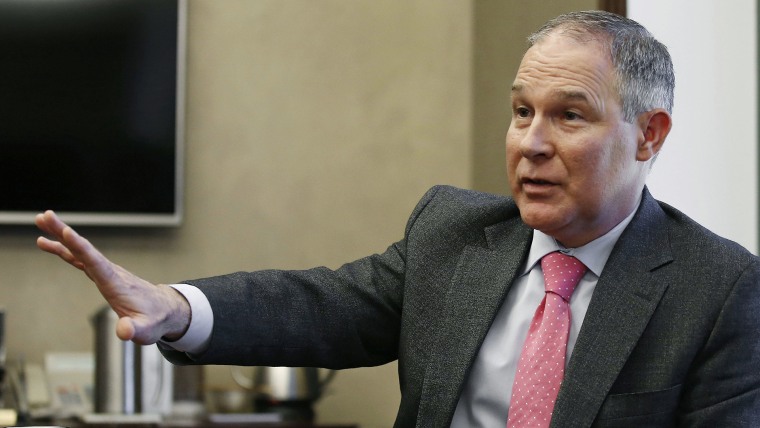EPA Administrator Scott Pruitt has developed a reputation for brazen corruption and abusing his office, but his champions tend to defend him, not just on ideological grounds, but on practical ones. Pruitt, the story goes, is ruthlessly effective in dismantling environmental safeguards -- which was the rationale for giving him this job in the first place.
Whatever one thinks of the far-right EPA chief and his agenda, it's hard to deny he's carefully executing his well-crafted plan, right? Well, maybe not.
As the EPA chief faces an avalanche of controversies, what if the assumptions about Pruitt's efficacy are wrong? What if the far-right Republican is actually far clumsier and more error prone when rolling back protections than his reputation suggests? The New York Times reported over the weekend:
[L]egal experts and White House officials say that in Mr. Pruitt's haste to undo government rules and in his eagerness to hold high-profile political events promoting his agenda, he has often been less than rigorous in following important procedures, leading to poorly crafted legal efforts that risk being struck down in court.The result, they say, is that the rollbacks, intended to fulfill one of the president's central campaign pledges, may ultimately be undercut or reversed.... Six of Mr. Pruitt's efforts to delay or roll back Obama-era regulations -- on issues including pesticides, lead paint and renewable-fuel requirements -- have been struck down by the courts. Mr. Pruitt also backed down on a proposal to delay implementing smog regulations and another to withdraw a regulation on mercury pollution.
The article added that when the EPA filed its legal justification last week on vehicle emissions, Pruitt presented his argument "in a 38-page document filed on Tuesday that, experts say, was devoid of the kind of supporting legal, scientific and technical data that courts have shown they expect to see when considering challenges to regulatory changes."
Richard Lazarus, a professor of environmental law at Harvard, told the Times, "In their rush to get things done, [Pruitt and his team are] failing to dot their i's and cross their t's. And they're starting to stumble over a lot of trip wires, They're producing a lot of short, poorly crafted rulemakings that are not likely to hold up in court."
The hype surrounding the EPA chief is starting to unravel. The New Republic's Emily Atkin explained the other day that Pruitt has been prolific in attacking environmental protections, "but so far, Pruitt’s biggest achievement is that he appears successful."
The piece went on to note that "at least ten of Pruitt’s intended regulatory rollbacks, in fact, are on hold due to lawsuits," and given the EPA's recent track record in the courts, those lawsuits against Pruitt's moves stand a decent chance of success.
Politico's Michael Grunwald added over the weekend that despite the Trump administration's regressive efforts, Pruitt "has not yet killed or rolled back any significant regulations that were in place when President Donald Trump took office. While Pruitt is often hailed (or attacked) as Trump’s most effective (or destructive) deregulatory warrior, the recent spotlight on his ethics ... has arguably overshadowed his lack of regulatory rollbacks during his first 15 months in Washington."
It's important to emphasize -- as Atkin and Grunwald both do in their pieces -- that Pruitt's antics haven't been completely without consequence. When he hasn't been focused on dangerous attempts to gut environmental protections, the EPA chief has gone out of his way to do real harm to the agency itself. That includes marginalizing science and scientists, many of whom have left the EPA and are unlikely to return.
And for some of Pruitt's proponents, maybe that counts as an accomplishment of note. But for those willing to put up with the EPA chief's corruption allegations because of masterful work dismantling the regulatory state, it's time to recognize that Pruitt's reputation and his record aren't as in sync as many have been led to believe.
